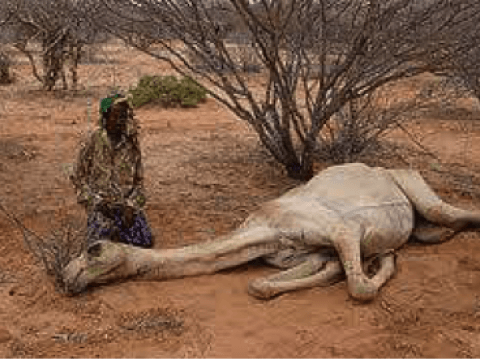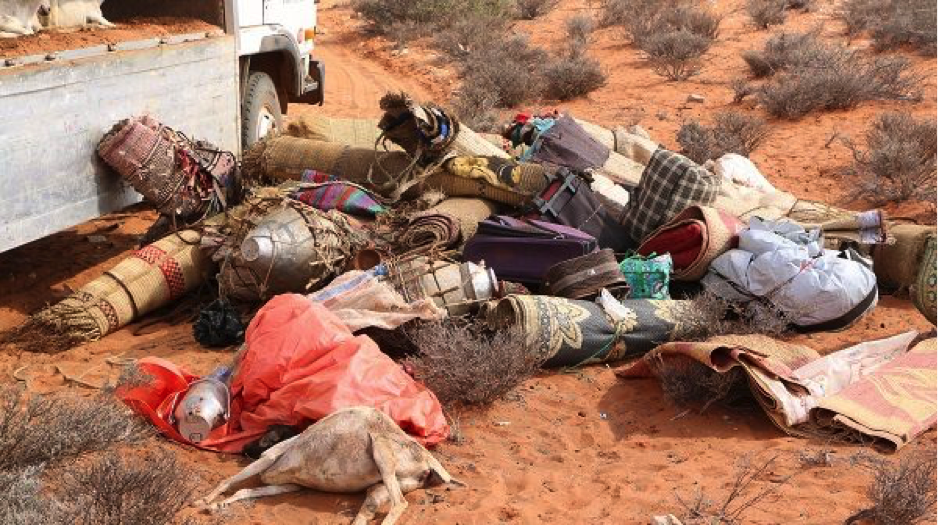What would be the anticipated hospitality from stressed drought & conflict affected communities?

I travelled to Jarriban district, Mudug region in Puntland to reassess, pre-identified locations within the district for WASH projects. This was aimed at avoiding overlap and to plan effectively for the resources that are available. The reality on the ground was appalling as communities were stressed due to lack of water and pasture for their livestock. There was also threats from neighbouring regions worsening the livelihood situation of the nomad pastoralists.
My first visit was Malaasle village, 40 km away from Burtinle; I stopped at a school facility that was part of the mission’s objective to check on the WASH (water and sanitation). Surprisingly, I found adult mothers in class. I thought they were teachers but they informed me that they were students. They learn in shifts; children come in the morning and they come in the afternoon to learn. However, students did not have access to water and the community were very thirsty. There was also no sanitation facility.
“Those of us who are left in the village use berkeds (underground water) for our water needs but they are all dried up”, said Faduma Ahmed, one of the students I met at the school.
Most families are moving out to areas where they can get pasture for their livestock and food. Osman Hassan Mohamed has lost most of his livestock and has decided to move to the urban centre to save the lives of his children.
According to a multi-sectoral assessment conducted in September 2016 by several organisations, 67 per cent of the communities use berkeds as their main source of water.
At Qalanqal village, I met only the elderly who could not talk to me, but after a while an old man spoke and said, “are you the ones who interview people and never come back to us?” This surprised me at it illustrated how stressful the communities are, given the rampant assessments done by many organizations with limited response owing to funding constraints. The same question was asked in all the villages I visited, but I explained to them that as World Vision we are different and that we support the vulnerable communities based on their assessed needs.
Cisse Ahmed has lost almost all of his livestock and he has no source of food for his family and they are suffering as they lack food and water
“The reason why we don’t welcome you well is because of the lack of support from the aid workers who come and interview us and never come back to us but we are happy to hear World Vision’s intervention for for us ” said Abdullahi Abdurahman Lugay, Galhagar chairman.
Villages across the coast that include Gara’ad, Dhinowda qoryo weyn, and Kulub were more water- stressed than the other villages such as Malaasle, qalanqal, balanbal, Salah. Those living at the coastal areas were worried about attacks from Alshabab as well as psychologically traumatised by the effect of previous conflict that have occurred in the area. Furthermore, the government has banned sea activities like fishing for a period of three months starting October to December. Fishing was their only source of employment and livelihood. The reason for the ban was attributed to the safety of the fishers as the sea was windy, the other factor was attributed to sea productivity and time was needed for the reproduction of lobsters.
The failure of three consecutive rains (Gu’ and Deyr in 2015 and also Gu’ in 2016) resulted in severe drought that has affected thousands of people in Puntland, where communities in Bari, Nugaal, Sool, Sanaag and Karkaar regions are the most affected.
The limited and erratic water availability reduces economic growth, induces migration, and ignites civil conflict, which further destabilizes migration.
World Vision with funding from UNICEF intends to implement WASH project in Jarriban district Mudug region. The project namely “Improving access to WASH services for vulnerable communities in Puntland” aims to achieve the following:
1) Increased access to sustainable and safe water supply for poor, vulnerable communities, children in school and in health facilities
11) Target population has access to relaible and sustainable environmental sanitation
Story by:
Osman Nur
WASH coordinator, Puntland

